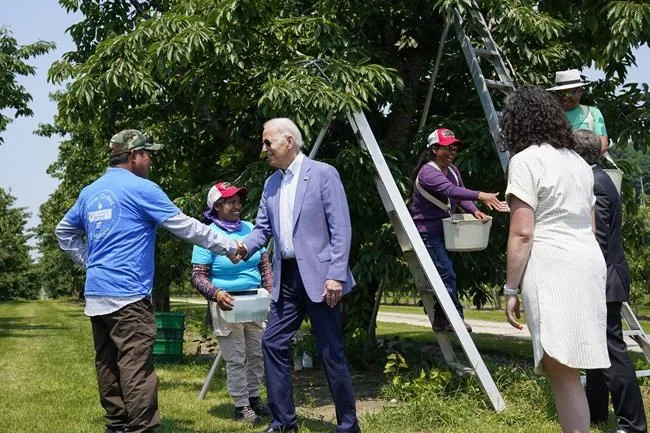Called a crucial figure in the growth of the United Farm Workers, Ben Maddock dies at 87 | News

He joined the US Marine Corps in 1956 and the trade union in 1969. According to legend and friends, he lived in a barn for part of his childhood and grew up on a family’s small citrus ranch in the countryside of Woodlake, Tulare County. Agriculture was in his blood and the octopus was in his hands, but Ben Maddock continued to fight for the rights of the weakest individuals in California’s rich agricultural industry.
Maddock, in collaboration with trade union leader Cesar Chavez, has organized large-scale vineyard strikes and international boycotts to gain historic legal protection for farm workers, unprecedented. Helped negotiate and manage union contracts.
Maddock, who became Chavez’s trusted best friend and a key figure in the union, died at his home in Wasco on July 9. He was 87 years old.
“Ben was an important person, one of the people who literally helped build UFW in the late 1960s and late 1980s,” UFW long-time spokesman Mark Grossman said in an email.
Grossman recalled that Maddock was closely associated with the organization, negotiations, contract management and strikes of agricultural workers in the Delano region.
“Ben from Anglo in Tulare County was part of the rainbow of farm workers who once existed in the valley,” Grossman said.
Maddock was born in Turea on June 27, 1934 and graduated from Woodlake High School in 1953. After working in the Marine Corps, Maddock began working as a tilesetter.
Guided by a desire for fairness and workers’ rights, Maddock led a strike by his fellow tile workers. Although the labor behavior turned out to be successful, Maddock was blackballed by his employer, Grossman wrote in honor of Maddock.
In the end, interested in making things better for the workers, he took up-and-coming labor activists to UFW’s office on “40 acres” on the outskirts of Delano.
According to Grossman, he promised to volunteer for the union for several months. Instead, he stayed for 22 years.
Maddock oversaw the distribution of the union newspaper, El Marquerado. Maddock, who refused to go to Keen’s Lapas when Chavez moved UFW’s headquarters there in 1971, became the union organizer of Delano.
Grossman said there was skepticism because Maddock did not speak Spanish. But he proved that he could.
Former UFW President Arturo Rodríguez praised him at a funeral mass in Wasco on Thursday. He was flying to service from San Antonio, Texas.
Paul Chavez, son of Chavez and chairman of the Cesar Chavez Foundation, was also present, as was farm workers and union officials holding the UFW flag. Grossman was also there, and he provided a copy of Eulogy to the Californians.
Rodriguez began by talking to Ben Maddock’s widow, Maria Maddock.
“Ben was a friend, mentor, teacher, and trusted adviser to Cesar Chavez and many of us in the trade union for 22 years,” Rodriguez said. “Your loss is also our loss.”
As the mourners listened, Rodriguez told stories one after another.
“I first met Ben in Detroit when I was organizing a second boycott of grapes in 1973. Ben came from a 73-year bitter and bloody grape strike in the Delano region, and with Maria. Born from a boycott.
“I was a young, environmentally friendly and idealistic organizer who recently graduated from college,” Rodriguez recalls.
The former union president said he was fortunate to learn from Maddock about organizing, strategy and building campaigns.
“These lessons never left me,” he said.
“For months we were picketing in front of A & P supermarkets throughout the Detroit Metro area, hoping they would be the first major supermarket chain to remove table grapes from the shelves.
“As we continued picketing in their parking lot, A & P management threatened to arrest us,” he recalled. “One Saturday, Ben helped us all make a plan. In the event of an arrest, we had to be ready to take action immediately.”
When the first picketters were arrested, they were found to be George and Sylvia Delgado, and two daughters Teresa and Christina, four and two years old, respectively.
They were also the granddaughter of Cesar Chavez.
“The next morning, on Sunday, the cover of the Detroit Free Press had a photo of her parents holding her while Teresa and Christina were all arrested,” Rodriguez said. “The sight has brought a lot of public contempt for the management of A & P.”
It was also a turning point for boycotts, and Maddock’s organization helped make that happen.
Maddock returned to Delano in 1975 and headed a 40-acre field office, Rodriguez said. His work will be crucial to the success of the procession, boycott, and enactment of what has become an agricultural and labor-related law.
According to an obituary about Maddock’s family, Maddock left UFW 22 years later. He was hired as a field representative for the California School Employees Association, where he worked until he retired.
Ben and Maria moved to Wasco to be surrounded by their families. In later quiet years, Maddock loved Christmas lights and was known for playing board and card games with his niece and nephew, and watching birdwatching, gardening, and the Dodgers.
But his years at UFW helped define his values and life.
Among the funeral mourners were dozens of current and former UFW colleagues who worked with Maddock, Grossman said.
“They came from all over California and from outside the state,” he said. “Many people were hoisting the black eagle flag of a small union in churches and graveyards.”
A large UFW flag covered the casket and was presented to Maddock’s widow after the graveyard worship was carefully folded into a triangle.
Years after his busy days, the 40-acre land is now recognized as a National Historic Landmark.
“There was a giant who walked those 40 acres,” Rodriguez told the rally on Thursday. “Names like Kennedy, Chavez and Reuters.
“There are countless other giants who have walked on those premises,” he said. “Many of them have been lost in history. One of them is Ben Maddock. Let’s never forget his name.”
Reporter Stephen Mayer can be reached at 661-395-7353. Follow him on Facebook and Twitter: @semayerTBC.
Called a crucial figure in the growth of the United Farm Workers, Ben Maddock dies at 87 | News Source link Called a crucial figure in the growth of the United Farm Workers, Ben Maddock dies at 87 | News







